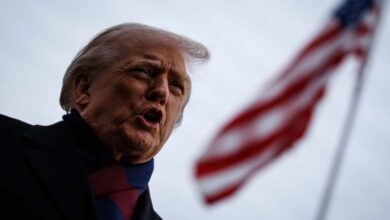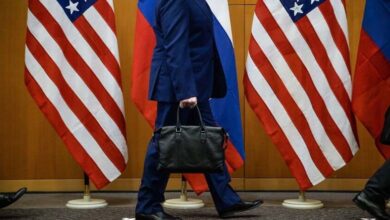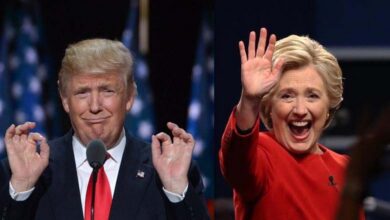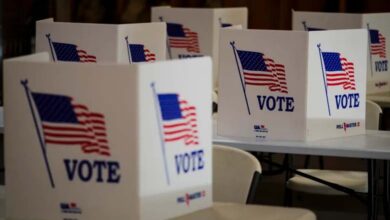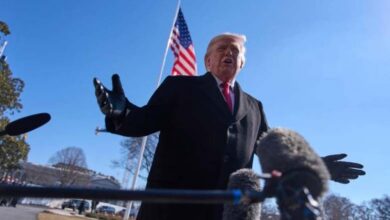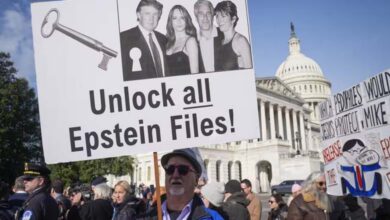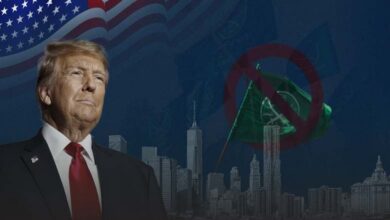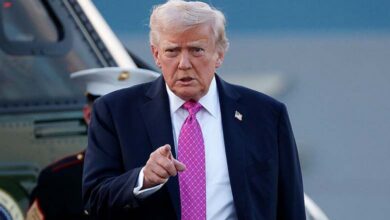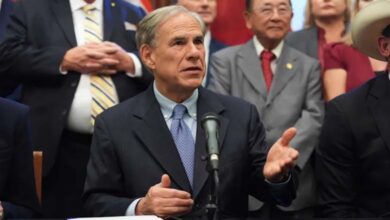Trump and the 11 Men: The Billionaire in the “Foreign Policy” Cave
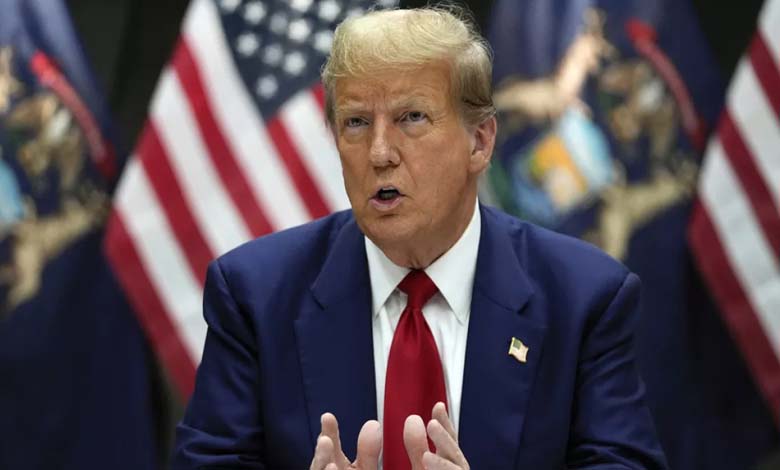
Far from the campaign trail, one way to gauge the potential foreign policy agenda for a second term of Trump is to determine the contours of 11 men.
-
Trump or Harris? The Stock Market Predicts the Winner
-
Indian or Black?.. Trump Plays on Harris’s Origins and the White House Responds
If former U.S. President Donald Trump returns to the White House, what will his foreign policy look like?
The answer to this question, according to a “Foreign Policy” article, lies in identifying the main national security thinkers in Trump‘s orbit, the advisors he will listen to, and the source of the ideas shaping the former president’s current worldview.
“Foreign Policy” examined the profiles of 11 men whose global views are shaping the Republican platform for 2024:
-
FBI Settles the Debate: Was It a Bullet or Shrapnel That Injured Trump’s Ear?
-
“Provocation Strike”: Trump Kicks Off His Battle with Harris
- Elbridge Colby Colby is the potential future defense chief under a Trump administration and is one of Washington’s strongest and most convincing voices calling for a radical shift away from Europe, NATO, and Russia towards the growing challenge of China.
Colby served as Deputy Assistant Secretary of Defense for over a year under Trump‘s previous administration, helping to promote the late U.S. pivot to Asia.
-
Accusations, “Insults,” and Program… “Trump’s Vice” Hits Back at Harris
-
With Diplomacy and Bandage: Trump Courts Kim and Attacks Biden
If given another chance in a future Trump administration—his name has been mentioned for another defense post or even a role on the National Security Council—he will reaffirm his belief that China, not Russia, is America’s greatest problem.
For years, Colby has advocated for the U.S. to use its limited defense resources to prevent an adversarial dominant power from taking control of the Asia-Pacific region.
-
After the Assassination Attempt, Will Trump Win the Elections? And What Are the Implications?
-
Biden-Trump Debate: Poll Reveals Who Has the Upper Hand
However, one problem Colby faces is that his potential future president, while sometimes willing to be antagonistic towards China, also manages global business affairs, and Trump has already expressed a willingness to cede on Taiwan independence.
Legislators may not be convinced by a defense strategy that focuses solely on Asia.
- Fred Fleitz Fred Fleitz is a veteran of the Trump administration and emerged as one of the former president’s few principal national security advisors during the campaign.
-
Despite the “Donation Comeback”… Cracks in Trump’s Campaign
-
“Convicted Criminal” : Biden’s Campaign Fires at Trump
Fleitz has spent over two decades in the U.S. government, holding various positions at the CIA, Defense Intelligence Agency, State Department, and on the Republican side of the House Intelligence Committee.
Fleitz, along with Keith Kellogg, crafted a plan to revise Trump’s policy to end the war in Ukraine if the Republican candidate were reelected.
The plan involves pushing Ukraine and Russia to meet for negotiations and to agree on a temporary ceasefire on current frontlines, which would be maintained during peace talks.
-
Trump’s Bet on ‘Hunter Biden’s Conviction’: Could it Backfire?
-
Author of 3 Books on Trump Reveals Tough Scenarios for Elections
“Foreign Policy” indicates that a Trump administration would pressure Ukraine from one side by threatening to cut American aid if it does not negotiate and Russia from the other side by threatening to open the doors to American military aid to Ukraine without peace negotiations.
Fleitz has stirred controversy due to his past comments and affiliations with far-right and anti-immigrant groups, which critics have labeled as marginal and anti-Muslim. (He has since distanced himself from some of these past affiliations.)
-
Will the ‘Dark Horse’ Do It? A New Obstacle on Trump’s Path to the Presidency
-
Trump and His Biographical Film: A “Grueling” Battle with a Dull Blade
- Rick Grenell A few hours after presenting his credentials to German President Frank-Walter Steinmeier in 2018, Trump’s new ambassador to Berlin, Rick Grenell, turned to Twitter (now “X”) to urge German companies dealing with Iran to “end their operations immediately.” From there, diplomatic relations soured.
Grenell, a politically appointed ambassador, threatened to withdraw American troops from Germany due to the country’s poor defense spending and imposed sanctions on the Nord Stream 2 pipeline, which would have increased the country’s dependence on Russian energy.
-
Trump’s Plane Involved in Collision at Florida Airport
-
These are the Republicans’ Conditions for Accepting Trump’s Loss… Will the 2020 Scenario Repeat?
Later, he was appointed special envoy to the Balkans—where he was accused of provoking the collapse of the Kosovo government—and as acting Director of National Intelligence.
Although many Trump administration figures distanced themselves from the former president after his defeat, Grenell remained loyal.
- Keith Kellogg When Michael Flynn was ousted from his position as national security advisor after only 22 days in Trump’s first term, Keith Kellogg was one of the first considered as a replacement.
-
Very Simple… Trump’s Secret Plan to End the War in Ukraine
-
Trump Shocks Netanyahu, Urges Quick End to Gaza War
However, he did not get the job, becoming instead the Chief of Staff for the National Security Council.
Kellogg sought to become a key member of Trump’s national security think tank at the Center for the National Interest, a think tank favorable to the Republican candidate.
Kellogg is a Vietnam War veteran and a proponent of both Ukraine and NATO.
He tried to support Trump’s commitment to ending the war in Ukraine “in one day” by developing a plan that would cut American military aid to Kiev if it refused to negotiate but increase it if the Kremlin refused to negotiate.
- Robert Lighthizer Few former Trump administration members retain significant influence over policy. But Robert Lighthizer, Trump’s trade representative and his current advisor, and possibly future Secretary of the Treasury, has become a prominent economic voice, partly due to his backward-looking trade vision, contributing to the Biden administration’s new passion for trade wars.
-
Former First Lady ‘Missing’… Where has Melania Trump disappeared to?
-
Trump’s plan if he wins the Presidency… Revenge and deploying the military
Lighthizer, a seasoned trade lawyer who began his career in public service under the Reagan administration, transformed Trump’s incomplete ideas on trade and the economy into a relatively coherent policy.
The famous tariffs Trump imposed on steel, aluminum, and many products from China were the result of Lighthizer’s vision.
His plans for the future, as reported in books and publications since he left his position, include imposing much higher tariffs on a larger number of countries to balance the U.S. budget, with a particular focus on China—one of the largest U.S. trading partners and a major geopolitical competitor.
-
Fraud charges haunt Trump, Dashing hopes of returning to the White House
-
In a move to expedite proceedings, Trump is preparing to conclude the election fraud case.
- John McEntee John McEntee, a former quarterback at the University of Connecticut, served as Trump’s “trusted man” during the first year of the administration.
He was removed by White House Chief of Staff John Kelly in 2018, only to return two years later with the position of Director of the Presidential Personnel Office.
McEntee helped orchestrate Trump’s reshuffling of senior Pentagon officials, including the firing of then-Secretary of Defense Mark Esper.
He also attempted, along with others, to fill top political advisory positions at the Pentagon with Trump loyalists.
-
At the Peak of the Election Campaign… Trump Faces First Criminal Charges in March 2024
-
The case of classified documents… a new legal dilemma facing Trump
- Christopher Miller Christopher Miller made some initial missteps after his appointment as Acting Secretary of Defense in the Trump administration in November 2020.
Miller was widely criticized for failing to approve the deployment of the National Guard to contain the pro-Trump riot on January 6, 2021, at the Capitol, for more than three hours after the Pentagon learned of the breach.
Miller later stated that he feared creating “the greatest constitutional crisis” since the Civil War by deploying active-duty troops. He also considered Trump deserving of criticism for inciting the riots but did not formally rule out working with him again.
-
Leaked documents… How did Trump plan to attack Iran in 2021?
-
A Judge Opens the Doors of History for Trump.. Will America be Governed from Prison?
In an interview, Trump spoke of Miller, describing him as “really very good.”
- Stephen Miller During Trump’s presidency, Stephen Miller made a name for himself as the radical architect of the president’s strict and widely controversial immigration policies.
If Trump wins the next election, he is widely expected to rely once again on Miller, who has already outlined new comprehensive proposals to reform American policy and tackle immigration.
As Trump’s principal advisor and speechwriter at the time, Miller played a central role in shaping his presidential agenda.
-
Judge Thwarts Trump Bid to Block Lawsuit Against Him
-
Trump to run for 2024.. Republican Party fears the consequences of the decision
He pushed some of the former president’s most controversial policies, including the family separation policy, known as “zero tolerance,” and the travel ban, which limited entries from certain Muslim-majority countries.
- However, Miller was also a staunch advocate for securing the border wall and controlling immigration policies.
- David Frenk Frenk played a major role in Trump’s foreign policy from late 2016 as Special Assistant to the President.
-
Trump’s Twitter Return.. Mask’s Gift for the U.S. Presidential
-
Donald Trump’s declining popularity among Republicans
In addition to his missions as a senior official in Trump’s foreign policy, Frenk worked on foreign aid issues and diplomatic relations with Asia.
He was one of the advocates for the bilateral defense partnership with India and the sale of military equipment to Taiwan. Frenk also participated in discussions with foreign leaders for diplomatic actions on national security issues.
- Stephen Bannon Stephen Bannon, Trump’s former Chief Strategist, was a prominent figure in the president’s administration.
-
Turkish hacker hacks Donald Trump’s website
-
Capitol Investigation – Trump lawyer tells former aides not to cooperate
Bannon, a former film producer and political commentator, played a role in shaping some of Trump’s early policies on immigration and trade.
Before his ouster in August 2017, he helped implement radical immigration policies and supported withdrawing the U.S. from international trade agreements.
Bannon, who continued to influence Trump’s ideas through social media and other channels, announced he would continue his efforts to shape Trump’s foreign policy in a potential second term.
-
After the fall of Kabul… Trump calls for Biden to resign
-
US: Russia accessed to Trump election data in 2016
- Richard Grenell Grenell, a former U.S. Ambassador to Germany, served in various diplomatic roles within the Trump administration.
He exercised significant influence as Acting Director of National Intelligence and Special Envoy to the Balkans. He is known for his approach to foreign policy, particularly regarding transatlantic relations and national security policy.
Grenell is also known for his critical stance towards European leaders and his role in pressuring Germany on its defense commitments.
-
Facebook and Instagram prevent Trump from posting on their system
-
Trump threatened Iran over the assaults on the US embassy in Iraq


